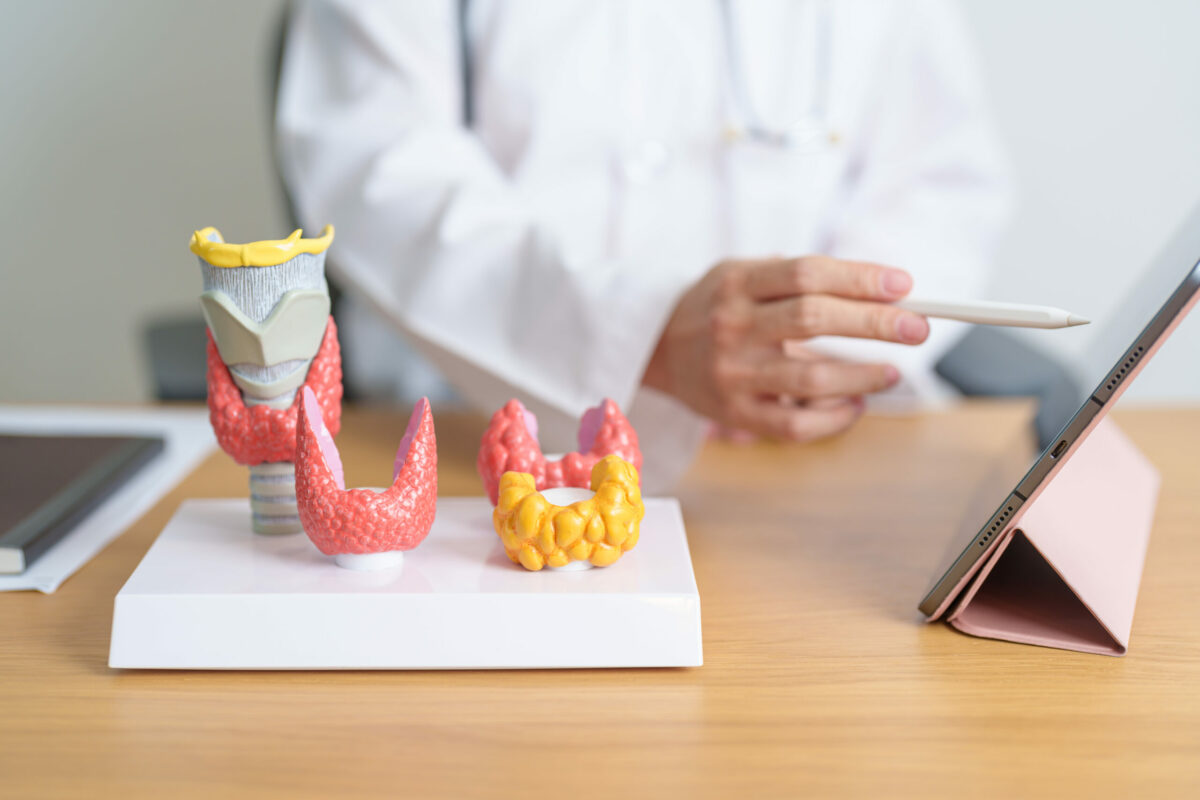An immune system condition in which the thyroid gland is affected is called Graves’ disease. This condition causes the thyroid to produce an increased amount of hormones (also called hyperthyroidism). Thyroid hormones are essential for the body to function properly. In people with Graves’ disease, multiple organs and body structures are negatively affected by the symptoms of this condition. While anyone may develop this condition, it mostly occurs in women and some people over 30 years old.
However, there are some treatment options that help reduce thyroid hormone levels and lessen the symptoms.
Symptoms
People with this disease usually experience the following symptoms. Check below the most common symptoms of Graves’ disease:
- Nervousness
- Irritability
- Tremors of the hands or fingers
- Increased heat sensitivity
- Sweating
- Abnormal weight loss
- Goiter (an enlarged thyroid gland)
- Menstrual cycle changes
- Erectile dysfunction (ED)
- Frequent bowel movements
- Thyroid eye disease or Graves’ ophthalmopathy (bulging eyes)
- Tiredness
- Palpitations (irregular heartbeats)
- Graves’ dermopathy (thick and discolored skin that often happens on the shins or top of the feet)
- Sleeping disturbances (insomnia)
Thyroid Eye Disease
This condition also is called Graves’ ophthalmopathy and approximately 25% of people with this disease develop it. It negatively affects the eye muscles and tissues. Commonly, thyroid eye disease causes the following symptoms:
- Bulging eyes
- Redness, inflammation, pressure, or pain in the eyes
- Puffy or retracted eyelids
- Increased light sensitivity
- Vision loss
- Double or blurred vision
Graves’ Dermopathy
People with Graves’ disease may develop this condition that causes thickening and darkening of the skin but in rare cases. You may notice that the skin has an orange peel-like texture. It appears due to a protein buildup in the skin. However, this condition in most cases is mild and painless.
If you experience any of the previous symptoms, immediately visit a doctor for diagnosis and proper treatment. Otherwise, it may lead to unpleasant outcomes (such as complications).
Causes
This condition happens due to a wrong immune system reaction. However, experts do not fully understand why it happens. Immunity produces antibodies that help fight against viruses, bacteria, and other harmful substances. In people with this disease, the immune system mistakenly attacks the thyroid gland causing it to produce more hormones.
There is another gland located at the brain’s base (the pituitary gland) that makes hormones that control the thyroid gland. Thus, the antibodies linked with this disease (thyrotropin receptor antibody or TRAb) work like the pituitary gland hormones, which leads the thyroid gland to produce more hormones than are needed. As a result, hyperthyroidism (overactive thyroid gland) occurs.
What Causes Thyroid Eye Disease?
While the exact cause is not known, it occurs due to carbohydrate buildup in the tissues and muscles of the eyes. However, healthcare providers think the same antibody is involved in this process. Commonly, Graves’ ophthalmopathy appears at the same time as hyperthyroidism but symptoms may appear within years before or after an overactive thyroid gland happens. Some people may develop thyroid eye disease without hyperthyroidism.
Risk Factors
There are some factors that increase your risk of developing Graves’ disease. Check some of them below:
- Age – People between 30-60 years old are more likely to develop this condition.
- Family history – Those who have a parent or sibling with this condition, are at increased risk of developing it too.
- Sex – Females are at higher risk of developing Graves’ disease compared to males.
- Autoimmune disorders – People who have other autoimmune conditions such as rheumatoid arthritis, type 1 diabetes, or others have an increased risk of developing the condition.
- Smoking – Tobacco products negatively affect the immune system, which significantly increases the risk of developing Graves’ disease. Moreover, if you are diagnosed with this disease, smoking worsens the condition.
What Are The Possible Complications of Graves’ Disease?
People with this disease also may experience some complications, especially without treatment. Examples include:
- Pregnancy problems – If a woman develops this condition during pregnancy, there is an increased risk of miscarriage, early birth, fetal thyroid problems, and poor fetal growth. Furthermore, Graves’ disease during pregnancy also may cause preeclampsia and heart failure.
- Heart disease – Those who do not treat Graves’ disease may experience certain heart problems including irregular heart rhythms (arrhythmia), which may lead to heart failure.
- Thyroid storm – This is a complication that may lead to death but it happens quite rarely. Sometimes, a thyroid storm is called accelerated hyperthyroidism or thyrotoxic crisis. It usually occurs in people who do not treat Graves’ disease. This complication may cause fever, confusion, delirium, severe weakness, excessive sweating, tremors, irregular heartbeats, hypotension (low blood pressure), and even coma.
- Osteoporosis – This is a condition that makes the bones weak, which increases the risk of fractures. It often occurs due to hyperthyroidism, which makes it difficult to keep calcium in the bones.
Diagnosis
Healthcare professionals usually perform the following tests to diagnose Graves’ disease. They may also perform a physical examination and ask some questions about your medical history and symptoms. Check below some tests used to diagnose this condition:
- Blood tests – These tests are used to measure thyroid-stimulating hormone (TSH) and thyroid hormone levels. In most cases, Graves’ disease causes low TSH and high thyroid hormone levels. An additional blood test may be required to measure antibody levels that cause the disease. If the antibody levels are in normal ranges, there may be another cause of an overactive thyroid gland.
- Radioactive iodine uptake – Normally, the body requires iodine to produce thyroid hormones and this test involves a small amount of radioactive iodine and an imaging test. This substance helps doctors see how fast the thyroid gland takes iodine. According to how fast the thyroid gland takes iodine, doctors may determine the cause of hyperthyroidism either Graves’ disease or others.
Treatment
The treatment goal is to reduce the symptoms and thyroid hormone production. It also blocks the hormone’s effect on the body. Check below some treatment options often recommended by doctors for people with Graves’ disease:
Radioactive Iodine Therapy
This treatment involves a medicine with radioactive iodine (called radioiodine) taken by mouth. It destroys thyroid cells that make hormones and over time thyroid gland shrinks. However, symptoms disappear gradually commonly within a few weeks or months.
Furthermore, this therapy may increase your risk of developing thyroid eye disease or worsen it. Thus, you should not take these medicines if you experience moderate to severe symptoms of thyroid eye disease. Radioiodine therapy should not be used in pregnant or breastfeeding women.
Anti-thyroid Medications
These medicines are used to block the thyroid from using iodine, which causes it to produce fewer hormones. Doctors usually prescribe Propylthiouracil and Methimazole. In most cases, Methimazole is used because Propylthiouracil is associated with an increased risk of liver failure.
In any case, when previous medications are used without other treatments, hyperthyroidism may return. Commonly, treatment with anti-thyroid medicines lasts up to one year. People who use these medications may experience some adverse reactions. These include rash, joint pain, liver failure, or reduced white blood cell count.
Beta-blockers
While beta-blockers do not stop thyroid hormone production, they block the hormone effects on the body. Doctors usually recommend beta-blockers to lessen irregular heartbeats, tremors, anxiety, irritability, heat sensitivity, sweating, diarrhea, and other Graves disease symptoms. Physicians often prescribe the following ones. For example:
- Atenolol
- Propranolol
- Metoprolol
- Nadolol
In addition, beta-blockers should not be used in people with asthma or diabetes because they may worsen these conditions.
Surgery
This procedure involves the removal of the thyroid gland (also called thyroidectomy). It may treat Graves’ disease but you will need medicines for the rest of your life to replace thyroid hormone once made by the thyroid gland.
Moreover, surgery is recommended when other treatment options do not work because it involves multiple risks. For example damage to the nerves that control the vocal cords, damage to the parathyroid glands, and others. Parathyroid glands control calcium levels in the blood.
Thyroid Eye Disease Treatment
People with mild thyroid eye disease usually need artificial tears during the day but if you experience moderate to severe symptoms, you may need a more serious treatment. For example:
- Corticosteroids – These medicines are used to lessen swelling behind the eyeballs. However, you may notice some negative effects of the medicine. For example high blood sugar, weight gain, fluid buildup (edema), hypertension (high blood pressure), mood swings, and others.
- Teprotumumab – This is an intravenous (IV) medicine that is given to the patients 8 times, once every 3 weeks. Common adverse reactions include hearing loss, nausea, diarrhea, muscle spasms, and high blood sugar.
- Prisms – Sometimes, people may experience double vision caused by Graves’ disease or as an adverse reaction to surgery for this condition.
Frequently Asked Questions
What happens if Graves’ disease is left untreated?
People who ignore the symptoms and do not get treatment for this condition may experience serious and even life-threatening complications. For example, arrhythmia, which may cause heart failure, stroke, and others.
What are the primary symptoms of Graves’ disease?
Those who suffer from this condition usually experience the following symptoms. For example:
- Muscle weakness
- Unusual weight loss
- Increased heat sensitivity
- Enlarged thyroid gland (also called goiter)
- Bowel movements that occur more often
- Tremors
- Nervousness
- Insomnia
Do not hesitate to consult your healthcare professional if any of the previous symptoms happen.
What is the difference between Graves’ disease and hyperthyroidism?
The difference between these conditions is that Graves’ disease is an autoimmune disease that negatively affects the thyroid gland. Hyperthyroidism (also called overactive thyroid gland) is a condition in which the gland produces excessive hormones. Moreover, Graves’ disease may cause hyperthyroidism. For more details, discuss it with your healthcare provider.




